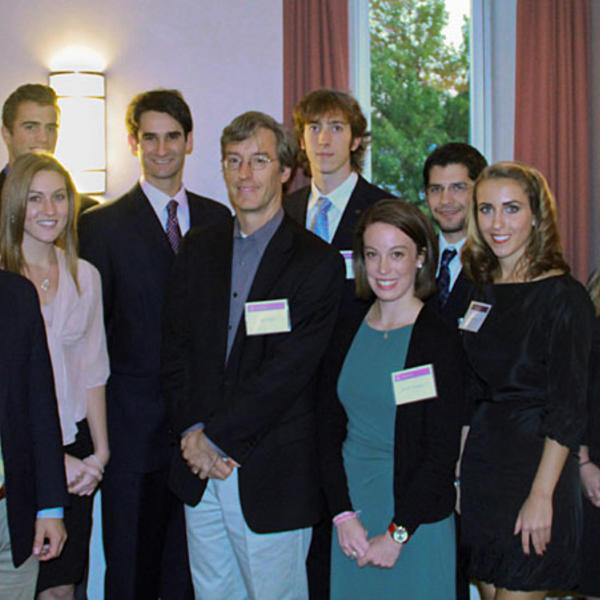Steven Levitt, best-selling author of Freakonomics and Superfreakonomics, visited campus recently to deliver the 46th annual Hanify-Howland lecture and meet with students.
As co-chairs of the Hanify-Howland Memorial Lecture Committee, we were thrilled to be able to sit down with the highly influential economist. We believe the Wall Street Journal said it best: “If Indiana Jones were an economist, he would be Steven Levitt.”
Since 1965, the Hanify-Howland lecture series has brought to the Holy Cross campus a series of distinguished speakers on public affairs who have exemplified in their own work the spirit of public service that the series was established to encourage.
Renehan: You mentioned you’ve been in Boston for about a decade, is this your first time visiting Worcester?
Levitt: Nope, I was in Worcester once before, seeing a Counting Crows concert. Boy, it was a long time ago, at least a decade. Back when the Counting Crows were good.
Renehan: In today’s lecture you mentioned the controversies surrounding your comparative study on car seats and adult seat belts. What could be so controversial about something so objective? Do we as humans fear objective thought at some level, and could this underlie a lot of the controversy?
Levitt: I think many issues of public policy are decided based on moral views and wishful thinking as opposed to facts. Many public policy issues are highly charged emotional issues whether it be child car seats or legalized abortion, and the Freakonomics approach is to put aside morality temporarily and try to understand the facts and what the facts say. Number one, it is a very uncomfortable circumstance for most people when talking about highly charged issues to put morality aside. It’s also just very unusual for a public figure to be talking about these issues but not really to have an agenda. Most people when you see them talking about an issue like abortion, have a very strong pro-choice or pro-life opinion behind it and your natural inclination is to believe what they say, because you think that they are using facts to support positions that they hold.
We come at it differently. We don’t really care what the answer is, we’re just trying to understand, say, when you legalized abortion, what happened to crime? And in no way are we saying abortion is good or bad or right or wrong, we don’t have a stance on that, we just address it in a different way, and that makes people really uncomfortable.
Woodgate: Could you recall any initial reactions to your ideas when you first presented them? Were people reluctant to accept them?
Levitt: Usually, the first audience I have for my ideas are economists, and economists are willing to think about anything. They’re willing to be challenged in ways that lay people often are not. Now, I’m not saying that I convinced the economists right away, but often I would be misled from talking to economists, that the kind of arguments that I was making were ones that were viewed as reasonable and persuasive. But then when I would present them to the real world I realized that was often not the case and that economists were not a very good test-audience for what the broader reaction would be.
Woodgate: Did you think your ideas would eventually turn into a best-selling book?
Levitt: No, the idea of a book never even occurred to me. Stephen Dubner, my eventual co-author wrote a profile of me for The New York Times Magazine, and even after he wrote that profile it never even dawned on me that anyone would want to read a book. But the publishers saw the piece he did, and they liked it. They came to me and said, “You should write a book.” And, I said to them, “Well, why don’t you go read some of my academic articles and I’m sure once you see how bad of a writer I am, you’re not going to want me to write a popular book.” It sounds crass, but the only reason we wrote the book was because they offered us a boatload of money. Nothing shocked us more than the fact that people actually wanted to read the book.
Renehan: What’s something that we as young readers can take away from this as far as how we perceive the world?
Levitt: I would say that one of the basic messages of our books is that thinking pays, thinking matters. There’s not enough emphasis on thinking, on challenging conventional wisdom, on trying to come up with creative solutions. That it’s often easier to follow the simple path, to do what conventional wisdom says to do, and, when people write me and tell me that they read my book and it made them think about a problem differently and I came to this great answer that solved the problem, that’s the best reward that can come as an author of writing books like this.
By Peter Renehan ’12 and Amanda Woodgate ’12
